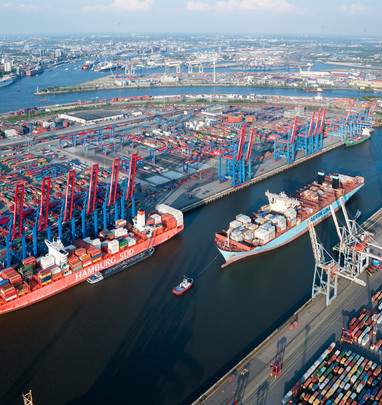Digitalization affects every enterprise because the digital transformation pervades every sector of the economy and impacts our entire society. The drivers of this change process are digital technologies, which continue to evolve at an ever-increasing speed, as well as customer expectations. Especially in the retail sector, this development can be very vividly illustrated by the rapid growth in e-commerce (the share of online shoppers in Germany rose from around ten percent in 2000 to 67.6 percent in 2016, Source: Statista) and the customization of products. But the digitalization of the economy is also very significant for productivity and efficiency: In order to be (inter)nationally competitive, businesses need to use digital infrastructures and applications and develop new business models and value networks. One example of this is the smartPORT in Hamburg, whose innovative infrastructure with intelligent, cloud-based IT platform comprehensively integrates transport routes, transport users, logistics centers and transit points. An important move if the Port of Hamburg is to keep up with the international competition in the future.
Diagonalization of the economy
The ultimate network and the instant, mobile exchange of data is the principle behind digitalization. For businesses, on the one hand it results in interlocked production processes with cutting-edge communications technology. On the other hand this exponential dynamism requires a fundamental change in industrial structures: In the place of siloing in classic clusters, the diagonalization of economic life will shape how we think in the future. Traditional verticals such as the automotive industry and logistics, or indeed service sectors such as banking, will become interconnected by digital innovations, creating a network spanning sectors, industries and technologies. This helps new areas for innovation, business models and markets to take shape diagonally to the verticals and the cross-sector technologies. The consequence is a transformation in the value chains that transcend corporate and national boundaries and in turn create new networks of value chains.
Organization of processes
In the digital age, corporate processes need to be as agile and flexible as digital technologies themselves. Constant progress is also continuously changing the requirements and conditions, so production processes and business models need to be adjusted accordingly. To handle the exponential disruption and sustainable forward-looking development, our economy needs non-central, versatile structures and a corporate culture that is based on collaboration and interdisciplinarity.
It is not sufficient to adjust the existing systems and processes in small steps, we need to overcome the fear of disruption and embrace new thinking. The future will belong to vital, adaptive businesses – whoever operates sluggishly and is hostile to innovation will be unable to cope with the permanent disruption of the digital shift. Whereas when we view disruption as a suggestion to change, we are able to respond more easily to crises and keep reinventing ourselves.


